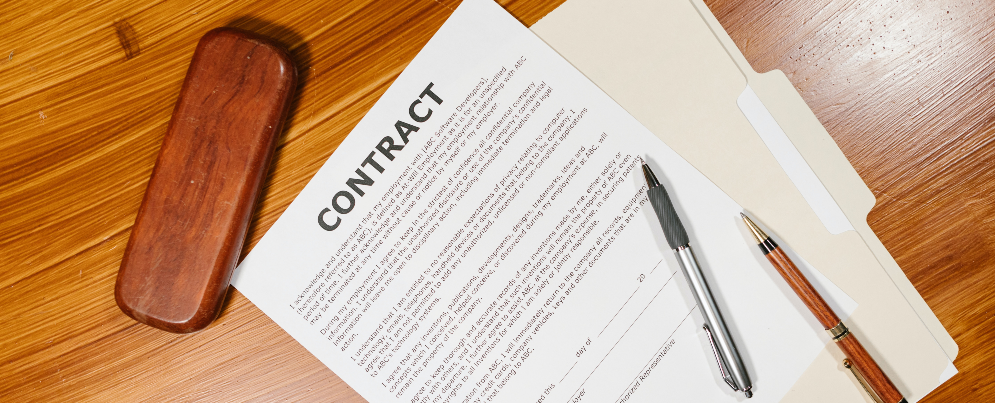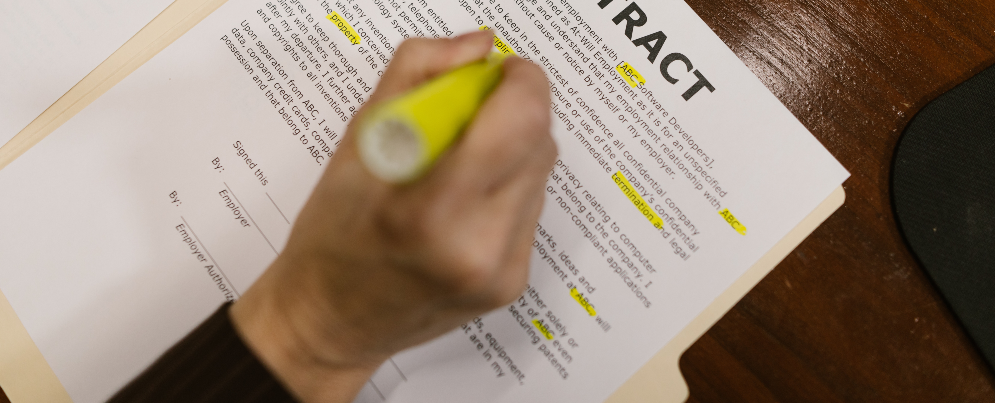
It does happen that you make a deal with a buyer and sign the purchase contract, but suddenly due to specific circumstances, you are not willing to sell your house. This is where a major question pops up in the seller’s head – is that even possible? Can the home seller back out of the contract? If yes, then when? And how?
If you are a seller pondering about backing out of your contract, you have reached exactly where you can find your answer. We shall find solutions to a lot of these questions related to real estate contracts in this post. Keep reading.
What Are Real Estate Contracts?
Any real estate transaction is backed by a contract, whether it is a purchase, sale, or exchange. The process of selling a house or buying one includes a great deal of documentation. The contract signed by the two parties in concern (the buyer and the seller) is a legal document and is governed by a set of rules to be followed. The agreement is not intended to harm one party while assisting another. This agreement serves only to protect buyers and sellers from fraud and to provide legal backing for a secure transaction.
The laws are different in different jurisdictions, hence the contract in one area may not be the same as in the other. There aren’t any vast differences, but small differences are to be expected.
Components Of Real Estate Contracts

For a real estate contract to be considered valid, some conditions are to be met. Following are some of the most important elements of a real estate contract that makes it valid.
The concerning parties
The two parties here would be the buyer and the seller. Both parties should be above 18 years old and mentally sound when signing the contract.
Has a legal purpose
Your signed real estate contract should not have clauses that approve of any illegal activity. For example, it should not include things like stealing, killing, or fraud.
Consideration
In common real estate transactions, consideration refers to money. However, it could be anything that has value and is used in the exchange. It could be of any nature or form.
Consent of both parties
There should be a mutual agreement between the parties involved in the transaction. The buyer may propose an asking price, but you always have the chance to negotiate. After you have settled at a price point profitable for both, you can move forward to sign the legal contract.
Terms and conditions
An offer is the first step in a standard real estate transaction. Until both parties agree with the price point, the contract shall not be deemed to have been executed. An acceptance signifies that the seller has accepted the conditions of the offer. Based on which jurisdiction you belong to, certain terms and conditions would be mentioned in the contract along with the purchase price both parties settled on.
Some of the common conditions seen in a real estate contract are:

- It should state who is responsible for paying the additional closing costs, such as the transfer tax, escrow fees, title insurance, and other expenses.
- How the buyer will pay for the property should also be outlined in the contract. The majority of individuals obtain a loan in order to purchase a property, thus, a purchase offer must state that acceptance is subject to obtaining sufficient funding. If the buyer is going to opt for an FHA loan, the buyer should make it clear in the contract. It should also be stated if you are paying in cash.
- Many people use the funds obtained from the sale of the existing house to buy a new house. If the seller has not yet bought a new house and they need the money from the current transaction, this should be included in the conditions.
- Most people conduct a home inspection before buying a property. If it turns out that the property has major repairs or replacements, the buyer can back out of the contract with a home inspection contingency. These contingencies and some others, like appraisal contingency, are included in the contract.
- Some people sell a semi-furnished house or a fully furnished house. They also give some appliances like an oven or dishwasher. In this case, the details about all the things included in the purchase, from furniture to appliances, should be included in the contract.
- The closing date will be one of the conditions. You can set the closing date after a discussion with the buyer. It could be anything say, 6 months or maybe 2 weeks if you are in a hurry. However, two weeks is a bit difficult for normal buyers. If you need to ,sell a home faster, an investor can help you with it.
What Are The Types Of Real Estate Contracts?

Home purchase agreement
A purchase agreement or the sale agreement is the most common form of real estate contract that deal with all the conditions associated with the sale of the property. The buyer and the seller are the two parties involved in the whole process.
Lease agreement
In this type of agreement, the two parties in concern are the owner of the property and the tenant. It will include details regarding the deposit amount and the paying method, etc.
Real estate assignment contract
The assignment contract is used mostly by the investors. As you may be aware, due to the ,advantages of selling a home to an investor, many sellers consider selling properties to real estate investors. Therefore, investors have to deal with a lot of properties at the same time. Transferring the ownership of so many properties is too time-consuming and expensive. This is where assignment contracts come into help.
So, how do real estate assignment contracts work? Consider a seller, investor, and end buyer. Now the seller sold the property to the investor. But the contract did not make the investor the owner of the property. Instead, it gave the investor the legal right to make someone else the owner of this property. So, when the end buyer decides to buy the property, the investor will make the end buyer the owner of this property. The investor’s name is not included in the chain of action. The investor might charge some fees required for the legal stuff from the end buyer.
Power of attorney
Suppose the owner of the property is injured or is mentally ill to sign the document. In this case, the power of signing the real estate contracts is given to someone else. The other party signs on behalf of the original owner.
Now that we have a clear understanding of what real estate contracts are, let’s deal with the main question. Can a seller back out of the contract? Well, yes, but under certain circumstances.
Why Would A Seller Back Out Of A Deal?
There could be many reasons why a seller wants to back out of the contract. Sometimes sellers expect to find a new house before the closing date but aren’t able to. This is when the seller would like to back out. It could also be the buyer’s fault. Maybe the buyer is not ready with their funds and the seller cannot wait any longer, so the deal is called off.
Another reason could be that the seller might have received a better offer. If someone is offering you a better deal after signing a contract, you would definitely want to step out of this deal and opt for the new one. However, are you allowed to do that?
There are instances where you can back out of the contract with or without any legal penalties. Let’s find out when you can and can not back out of a real estate contract.
Instances Where The Seller Can Back Out Of A Real Estate Contract

The contract hasn’t been signed yet
Any real estate contract is considered valid once both parties have accepted the offer and have signed the papers. You cannot simply cancel the accepted offer backed by a signed agreement. The buyer can take you to court for a legal battle and mostly, it is the buyer who wins such cases. Why? Because the seller is at fault here. The seller had agreed on an offer and even made it official, now, the seller cannot back off. It’s like cheating the current buyer. So, if you want to step back out of this deal, do it before you sign the purchase agreement.
Within the attorney review period
I did say that once the buyer and the seller each sign the document, they cannot step back; however, there is a way to get out of the contract even after signing. After the two parties sign the contract, it is sent for review. The real estate attorney checks the contract, and papers will be canceled immediately if anything is missing from your contract. It takes about five business days to complete this review. Within these five days of the attorney review period, if the seller or the buyer wants to cease the purchase agreement for any reason, your respective attorneys can do so.
Home sale contingency
When you are the seller of an existing home and a buyer of a new one, this can be of great use to you. A home sale contingency allows you to step out of the home purchase contracts if you fail to sell your existing home. The seller of your new home is at a disadvantage here, hence to keep it fair, you can add a release clause. A release clause or a kick-out clause will allow the seller to advertise their house to find another potential buyer despite accepting your offer. The seller may grant you a 72-hour window to cancel the contract if they get a strong bid.
The buyer does it for you
A due diligence contingency clause gives the buyer time to cancel the contract for any reason. This is the time frame when the user conducts a house inspection. If it is found during the inspection that the house needs some constant repairs, the buyer can ask the seller to give a discount to cover the expenses incurred, or the buyer can ask the seller to repair the property. If the seller is unwilling to do either of these two things, the buyer will simply opt out of the contract.
Buyer fails to secure financing
As I mentioned before, your contract should mention the method of financing used by the buyer. Most buyers will go for a home loan. They might have a pre-approval, but pre-approval doesn’t always mean a guaranteed loan. The buyer’s lender can still refuse to approve a loan for their house. If the buyers fail to arrange funds for the property in the given time period, the sellers can cancel the contract.
Legal Consequences Of Breaching A Contract

After you have signed the contract and the review period is over, canceling the contract becomes way difficult. If you cancel the contract after the review period, you will be at fault. The buyer can drag you into court and make you complete the transaction. Otherwise, you will be liable to pay some legal penalties and any monetary compensation if the buyer has paid for something anticipating the purchase. If the issue escalates, the one at fault might have to face serious consequences.
This can also become a good method of canceling the purchase contract if the buyer decides not to sue you. You just have to give some compensation to the buyer to cover their loss and opt out of the contract.
Tips To Avoid Legal Consequences After Breaking The Contract
Be pragmatic
We understand that selling a house is a very emotional process. However, do not let your emotions overpower a meticulously-made investment decision. Many sellers decide to sell their homes, but as they approach the closing date, they don’t feel like giving up on their homes. Change is difficult for anyone. Still, we insist you stay calm.
A verbal agreement is not valid
You might have agreed upon a price point and certain terms of the deal verbally, but none of this becomes official until you sign the contract. So, take your time and make a decision. Even after saying a yes verbally, you are allowed to cancel the deal.
Make use of contingencies
If there are some contingencies in your contract that will help you back out of the contract, make use of it to safely cancel the contract.
Read the contract carefully
Take help from a good lawyer and read the entire contract carefully. If you don’t understand something, make sure your lawyer helps you understand.
Bottom line
Real estate contracts are made to give legal backing to both parties associated with the transaction. There can be instances where the seller would like to opt out of the contract. Although the seller might be considered at fault when they break the contract, there are ways in which you can cancel the contract.
We suggest that you use some contingency clauses in your agreement to make it easy for you to back out of the contract. You may or may not need them, but there is no harm in having some safe exits out of the contract. Take your time to make the decision before you get started with the legal stuff. Making the papers requires a good deal of legal fees. Unlike buyer’s real estate agent fees which are paid by the seller, buyer’s legal fees are the buyer’s responsibility.
Canceling the document simply means that you wasted that money. So think before you finalize the contract.








